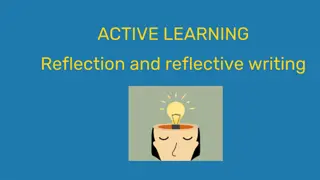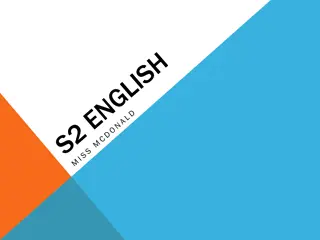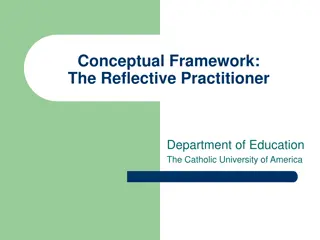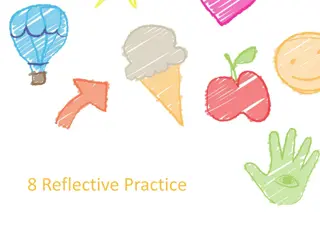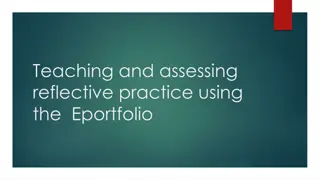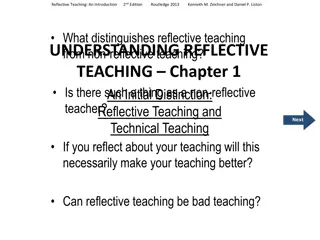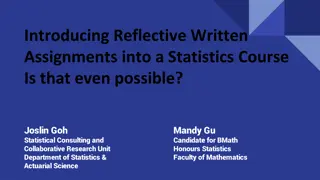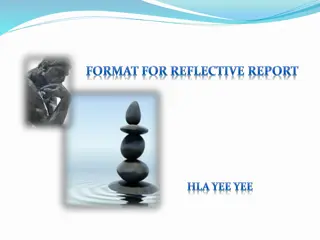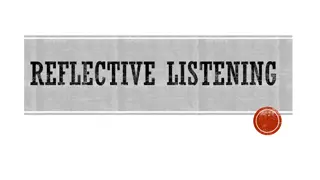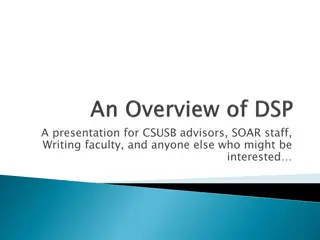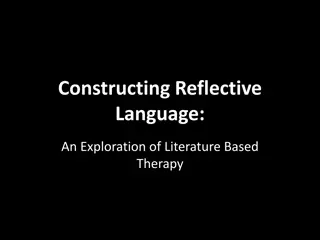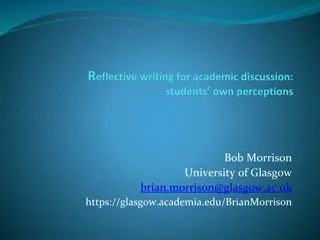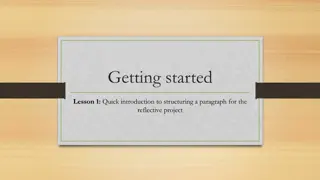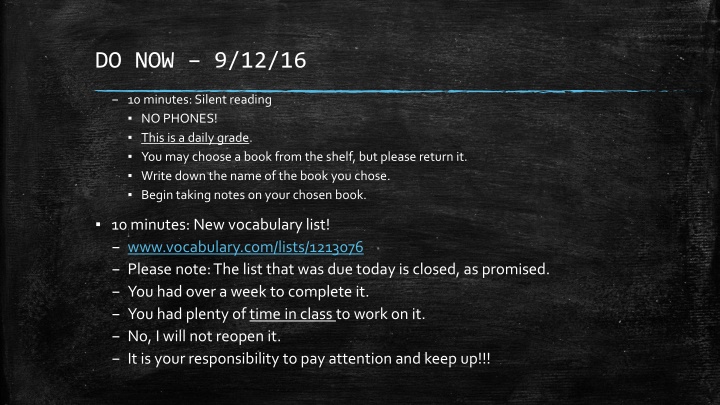
Reflective Writing and 6+1 Traits of Writing in Literary Analysis
Explore the practice of reflective writing, focusing on personal emotions and experiences, alongside the 6+1 Writing Traits model for quality writing. Reflect on past events through expressive writing techniques to enhance literary analysis skills.
Download Presentation

Please find below an Image/Link to download the presentation.
The content on the website is provided AS IS for your information and personal use only. It may not be sold, licensed, or shared on other websites without obtaining consent from the author. If you encounter any issues during the download, it is possible that the publisher has removed the file from their server.
You are allowed to download the files provided on this website for personal or commercial use, subject to the condition that they are used lawfully. All files are the property of their respective owners.
The content on the website is provided AS IS for your information and personal use only. It may not be sold, licensed, or shared on other websites without obtaining consent from the author.
E N D
Presentation Transcript
DO NOW 9/12/16 10 minutes: Silent reading NO PHONES! This is a daily grade. You may choose a book from the shelf, but please return it. Write down the name of the book you chose. Begin taking notes on your chosen book. 10 minutes: New vocabulary list! www.vocabulary.com/lists/1213076 Please note: The list that was due today is closed, as promised. You had over a week to complete it. You had plenty of time in class to work on it. No, I will not reopen it. It is your responsibility to pay attention and keep up!!!
Objectives What am I learning? Reflective Writing, The Six Traits of Writing, and Literary Devices Why am I learning it? To be able to properly and vividly express my thoughts and experiences on paper How will I know I learned? I will have written a personal reflective poem, using the six traits and literary devices.
Personal & Reflection Writing Drawing from your past to evoke emotions on paper.
What is personal reflection writing?
Reflective writing is a practice in which the writer describes a real or imaginary scene, event, interaction, passing thought, or memory. The writer adds a personal reflection on the meaning of the item or incident, thought, feeling, emotion, or situation in his or her life.
6+1 Writing Traits The 6+1 Trait Writing Model of Instruction & Assessment comprises 6+1 key traits that define quality writing. Ideas the main message Sentence Fluency the rhythm and flow of the language Organization the internal structure of the piece Conventions the mechanical correctness Voice the personal tone and flavor of the author's message Presentation how the writing actually looks on the page Word Choice the vocabulary a writer chooses to convey meaning
Teacher Models: Weighing by Neil Carpathios looking at the face I ve earned with countless joys and griefs. Shaving, I wonder how much the mirror would weigh One day I will shave and do with nothing in it. the ritual not knowing it is the last time. Every morning I am rehearsing I step away, step back, touch glass with fingertips. Every day I do this, saying goodbye to myself.
Annotation of Weighing Free Verse Poem. Tone, Theme, Imagery, Foreshadowing Ideas and Content: the scene is set (shaving in the bathroom mirror), easy to put yourself in the writer s place (right in the mirror, shaving), not at all generalized. Organization: short and sweet, easy to read, ends with a bang Voice: pulls the reader in instantly, must be read at a slower pace, lower voice. Pay attention to the punctuation marks and pause when prompted. Word Choice: deliberate. Every word chosen carefully. Mood: stoic, morbid. Showing meaning (Every day I do this,/looking at the face/I ve earned/with countless joys and griefs) Fluency: very easy to read, smooth transitions, variety of words! Conventions: everything is spelled correct. Punctuations used in interesting ways to command dramatic pause.
During Our Next Class Period: We will review reflection writing and the six traits of writing. You and your shoulder partner will read a famous reflection poem. The two of you will list the six traits that we discussed today and explain each trait according to the reflection poem, just I modeled for you. The two of you will locate at least four literary devices in the poem and record the lines in which you located the devices. The two of you will explain why the poem is considered a reflection poem.
Use the remainder of the class period to: Work on your current vocabulary.com list that is due on Monday, September 19th. It will close on Monday morning. Read silently. This will become a daily expectation, so get a feel for it now. You may choose a book from the shelf, but please return it. Write down the name of the book you chose. Begin to take notes on your chosen book. Everyone should be occupied. An idle mind is Negativity s workshop! Keep in mind: If I don t see you working that leads me to believe that you are satisfied with your progress in this class and I should have no need to sympathize with your whining or requests when grades are due. You are responsible for you!
LAUNCH In the end, it s not the years in your life that count, it s the life in your years. -Abraham Lincoln Have a great week!

